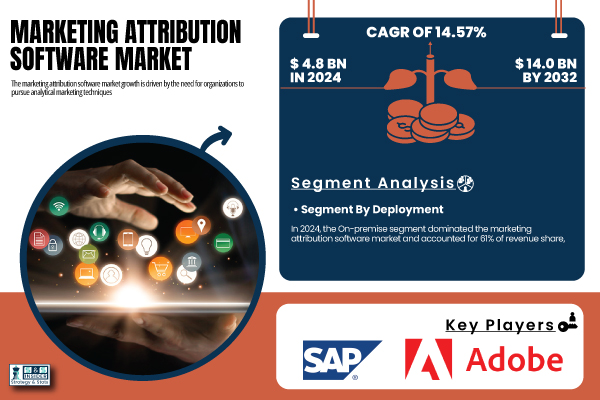The global Marketing Attribution Software Market is on track to grow significantly, projected to reach USD 14.0 billion by 2032, up from USD 4.8 billion in 2024. This growth represents a compound annual growth rate (CAGR) of 14.57% during the forecast period of 2025–2032. The surge is primarily driven by the increasing demand for real-time customer insights and the optimization of multi-channel marketing campaigns.
Businesses are increasingly adopting performance-based marketing techniques, which necessitate the use of advanced attribution software. In today’s digital landscape, marketers face immense pressure to demonstrate the effectiveness of their expenditures. Attribution software is essential for identifying which marketing strategies lead to conversions, allowing for a more efficient allocation of resources.
Market Trends and Projections
The growth of the marketing attribution software market in the United States is particularly noteworthy. The market is expected to expand from USD 1.3 billion in 2024 to USD 3.7 billion by 2032, achieving a CAGR of 12.8% over this period. This growth can be attributed to the rapid adoption of data-driven marketing strategies and the increasing execution of multi-channel campaigns. The integration of artificial intelligence (AI) and machine learning technologies is further enhancing the capabilities of these tools.
As customer journeys become more complex, companies are turning to sophisticated attribution tools to track performance accurately and maximize their return on investment (ROI). The Multi-source Attribution segment was the most significant in 2024, capturing 49% of the market share. This model allows for a fair distribution of credit across various touchpoints in a consumer’s journey, making it increasingly relevant as businesses adopt omnichannel strategies.
Regional Insights and Key Players
North America currently leads the global marketing attribution software market, accounting for over 41% of the total market share. This dominance is due to the region’s advanced digital infrastructure and robust investments in AI. Businesses in North America are particularly focused on data-driven engagement across multiple platforms.
The Asia Pacific region is poised to experience the fastest growth in this sector, driven by rapid digitalization, expanding e-commerce, and a rise in the use of cloud-based solutions, particularly in nations like India and China. Government initiatives aimed at improving digital infrastructure are also contributing to this growth.
Key players in the marketing attribution software market include industry giants such as Adobe, Google, SAP, Oracle, Nielsen, HubSpot, Salesforce, and Neustar. These companies are continuously innovating their product offerings to stay competitive in this evolving landscape.
Recent developments highlight the ongoing transformation in the industry. In January 2025, Google announced the integration of its Attribution Reporting API with the Privacy Sandbox initiative. This new feature enables marketers to obtain summary reports for conversion measurement while adhering to evolving privacy regulations.
As businesses increasingly recognize the importance of effective attribution in their marketing strategies, the demand for advanced marketing attribution software is expected to rise. With the market projected to reach USD 14 billion by 2032, the emphasis on real-time insights and multi-channel optimization will likely continue to shape the future of marketing technology.
